 The first few years of PC history were its stone age–the era when any signs of life whatsoever were history-making. The period from 1985 to the present, as amazing as it’s been, has been one of consistency and compatibility. Which is why I think of 1980-1985 as the most interesting half-decade in PC history. Almost every new system (including some that debuted in 1979) was still an experiment–and even flops could be fascinating. Herewith a gallery of notable examples, illustrated with evocative drawings from Google Patents. (Click on the filing dates to see the patents in their entirety.)
The first few years of PC history were its stone age–the era when any signs of life whatsoever were history-making. The period from 1985 to the present, as amazing as it’s been, has been one of consistency and compatibility. Which is why I think of 1980-1985 as the most interesting half-decade in PC history. Almost every new system (including some that debuted in 1979) was still an experiment–and even flops could be fascinating. Herewith a gallery of notable examples, illustrated with evocative drawings from Google Patents. (Click on the filing dates to see the patents in their entirety.)
Tag Archives | Nostalgia
The Very First Review of Google?
 Last week, I rounded up some of the earliest reviews of Google–most of them positive, none of them predicting what would become of it over the next few years. Karen Wickre of Google saw the story and wrote to clue me in to a piece even earlier than any of the ones I found, which it rediscovered when putting together a tenth anniversary corporate timeline last year. Fittingly enough, it’s by search guru Danny Sullivan (now of Search Engine Land), and it appeared in the August 4th, 1998 issue of Search Engine Watch’s Search Engine Report newsletter:
Last week, I rounded up some of the earliest reviews of Google–most of them positive, none of them predicting what would become of it over the next few years. Karen Wickre of Google saw the story and wrote to clue me in to a piece even earlier than any of the ones I found, which it rediscovered when putting together a tenth anniversary corporate timeline last year. Fittingly enough, it’s by search guru Danny Sullivan (now of Search Engine Land), and it appeared in the August 4th, 1998 issue of Search Engine Watch’s Search Engine Report newsletter:
So how about the results? I think many people will be pleased, especially for the ever-popular single and two-word queries. A search for “bill clinton” brought the White House site up at number one. A search for “disney” top-ranked disney.com, and sections within it like Disney World, the Disney Channel, and Walt Disney Pictures. Yet interesting alternative sites, such as Werner’s Unofficial Disney Park Links, also made it on the list.
Will Google be going commercial? [Co-founder Larry] Page has no opposition to it, but said there’s no particular hurry.
“We’re Ph.D. students, we can do whatever we want,” he said. And what they want is to find the right partners to let them focus on improving relevancy. “I’d like to build a service where the priority is on giving users great results,” Page said.
The whole thing is such an entertaining read that I’m tempted to quote it in its Google-related entirety, but go here to enjoy it.
One comment
Where No Pitchman Had Gone Before
In case you hadn’t noticed, the Star Trek movie opened tonight. Which, here on Technologizer, is an excuse to bring you a YouTube clip that never gets old:
Oh, and if you didn’t catch Ed Oswald’s story on Star Trek technology that’s no longer science fiction when we published it a few weeks ago, check it out here.
One comment
A Brief History of AOL Annoyances
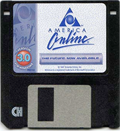 One of the longest-running rumors in tech (it dates at least to 2003) is finally fact: Time Warner has told the SEC that it plans to spin off AOL, thereby undoing the gargantuan, famously disappointing merger that put an aging dial-up service, AIM, Marvin Martian, and Sports Illustrated under one corporate roof. By way of unintentional celebration, let me steer your towards 20 Years of AOL Annoyances and Foul-Ups, a story I wrote for my pals at PC World. (Did you know that AOL took the name “AOL” in 1989? Neither did I, until PCW’s Anne McDonald told me. That was also the year that it first began telling users that They Had Mail!)
One of the longest-running rumors in tech (it dates at least to 2003) is finally fact: Time Warner has told the SEC that it plans to spin off AOL, thereby undoing the gargantuan, famously disappointing merger that put an aging dial-up service, AIM, Marvin Martian, and Sports Illustrated under one corporate roof. By way of unintentional celebration, let me steer your towards 20 Years of AOL Annoyances and Foul-Ups, a story I wrote for my pals at PC World. (Did you know that AOL took the name “AOL” in 1989? Neither did I, until PCW’s Anne McDonald told me. That was also the year that it first began telling users that They Had Mail!)
My story covers the ill-fated merger, outages and busy signals, cheesy marketing tactics, sleazy chat rooms, some really bad TV commercials, the infamous recording of an AOL rep refusing to cancel some poor guy’s service, the even more infam0us privacy problems relating to AOL’s publishing of search logs, and, of course, all those millions of demo disks. I had a good time writing it, but the experience left me feeling a little sorry for AOL, a service which, for all its self-inflicted wounds, did more than anyone to jump-start the online revolution. Maybe I’ll write a story about all the stuff it did right at some point.
2 comments
Opera Turns 15, Claims Title of World's Oldest Web Browser
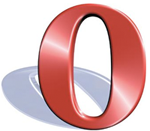 The folks at Opera are celebrating the fifteeth anniversary of their Web browser today. They’ve got some fun celebratory items up, including memories from cofounder and CEO Jon von Tetzchner, a secret origin in comic-strip form, some predictions for the future, and a list of fifteen reasons to use Opera.
The folks at Opera are celebrating the fifteeth anniversary of their Web browser today. They’ve got some fun celebratory items up, including memories from cofounder and CEO Jon von Tetzchner, a secret origin in comic-strip form, some predictions for the future, and a list of fifteen reasons to use Opera.
The company’s saying that Opera is the oldest browser that’s still extant, and while that’s a defensible interpretation of history, it’s subject to debate. It’s marking its fifteenth birthday not on the anniversary of the first public release of the browser–that didn’t happen until 1996–but on the anniversary of the beginnings of coding on the first version, which was a research project at Norwegian telecommunications company Telenor. If you determined the oldest remaining browser based on general availability, Internet Explorer, which was released in 1995, would predate Opera. And IE was originally based on code from Spyglass Mosaic, the commercial version of NCSA Mosaic, the first graphical browser–but I don’t know if there’s any Mosaic code kicking around in today’s IE 8.
Firefox, meanwhile, is a descendant of Netscape Navigator (which first appeared in late 1994 and was officially discontinued in 2007). But work on Netscape began in mid-1994–after Opera development was already underway, apparently.
Meanwhile, there’s at least one dark-horse candidate for the title of Oldest Browser Still Standing: Lynx, a text-only browser which I used myself back in the early 1990s. Here’s an OS X version posted at Apple’s site a little over a year ago, and here’s source code from 2007 with a note that a new version is under development. Lynx supports neither graphics nor JavaScript, and I suspect that most modern sites are simply unusable in it–let’s not even talk about Flash here, folks–but it’s a browser. And if it’s gone to browser heaven, it did so only recently.
Anyhow, Opera is one of a handful of popular Internet apps of the mid-1990s that’s still with us, still evolving, and still doing interesting things–especially on alternative devices such as phones and gaming consoles. Long may it wave…
6 comments
Whatever Happened to the Top 15 Web Properties of April, 1999?
![]() As I quietly lamented (or at least noted) the impending death of GeoCities today, I wanted to double-check my memory that it was once one of the very largest sites on the Web. Yup–ten years ago, in April 1999, Web measurement company Media Metrix rated it as the sixth largest online property. Which got me to wondering: How many of 1999’s Web giants remain gigantic today–assuming they still exist at all?
As I quietly lamented (or at least noted) the impending death of GeoCities today, I wanted to double-check my memory that it was once one of the very largest sites on the Web. Yup–ten years ago, in April 1999, Web measurement company Media Metrix rated it as the sixth largest online property. Which got me to wondering: How many of 1999’s Web giants remain gigantic today–assuming they still exist at all?
That’s a relatively easy question to answer, since the Media Metrix report (which is now conducted by ComScore) still comes out monthly. In fact, Comscore released the numbers for March 2009 yesterday. So I did a comparison between the April 1999 report and the March 2009 one. Are you stunned to learn that more companies fell off the top 15 than stayed on it, and that some of 2009’s biggest properties didn’t exist at all in 1999?
60 comments
My Most Memorable Computer Was…
 Got a moment to get all nostalgic over old electronic equipment? Over on Twitter–where I’m @harrymccracken and a feed of all Technologizer stories is available at @technologizer–I tweeted thusly:
Got a moment to get all nostalgic over old electronic equipment? Over on Twitter–where I’m @harrymccracken and a feed of all Technologizer stories is available at @technologizer–I tweeted thusly:
@harrymccracken
Of all the computers you ever owned or used, which meant the most to you? I’ll run the most fun responses on Technologizer and give credit.
More than three dozen folks responded. Here’s the count of memorable computers by brand–two companies dominated:
Apple: 9
Commodore: 8 (no C64s, though–surprising!)
Homebuilt: 4
Atari: 3
IBM: 3
Sinclair: 2
Toshiba: 2
Radio Shack: 1 (hey, where were all the Tandy fanatics?)
Amstrad: 1
Compaq: 1
IMSAI: 1 (archaic!)
NeXT: 1 (classy!)
Osborne: 1
Packard Bell: 1
After the jump are all thirty-eight tweets (and Facebook messages) I got. If you weren’t one of the respondents, please chime in via comments… Continue Reading →
47 comments
Game Boy Oddities
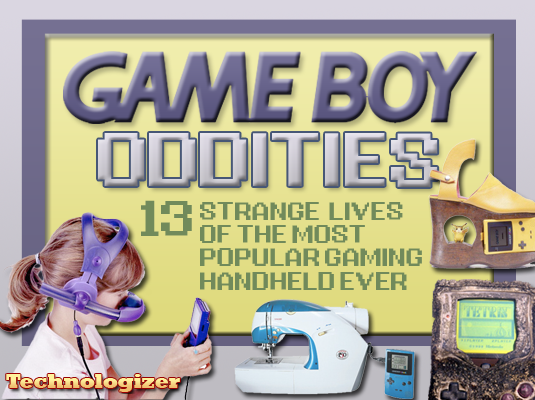
When Nintendo released the original Game Boy twenty years ago next week, wheels of capitalism and creativity immediately started turning in noggins across the globe. From artists mesmerized with the gaming gadget’s iconic status to inventors who saw it as a way to make the world a better place to folks who just wanted to cash in, the Game Boy has inspired weird accessories, variations, and tributes. After seeing the items I rounded up for this extravaganza, you’ll probably agree that the public’s infatuation with this classic handheld has grown far beyond Nintendo’s wildest dreams.
57 comments
The Ten Worst Microsoft Product Names of All Time
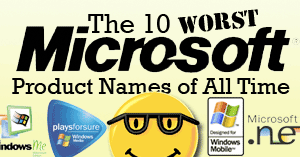 [NOTE: I wrote this piece for my pals at PC World, who kindly agreed to let me publish it here, too.]
[NOTE: I wrote this piece for my pals at PC World, who kindly agreed to let me publish it here, too.]
If Microsoft had invented the iPod, it would have been called the Microsoft I-pod Pro 2005 Human Ear Professional Edition. The cult-hit video that makes that assertion may have been a joke, but it rings true. And when word emerged that the video was a self-parody produced within Microsoft, the point was even clearer: The world’s largest software developer just isn’t very good at naming stuff.
Some Microsoft names sound clunky; some are confusing; some are undignified or overambitious. More than any other company in technology, the behemoth of Redmond loves to change product names–often replacing one lackluster label with an equally uninspired one. Microsoft has also been known to mess up some names that are actually perfectly good, such as Windows and Word, by needlessly tampering with them.
Herewith, in chronological order, are ten Microsoft names that could have been a lot better, together with some semiconstructive advice on monikers that would have more euphonious and/or more accurate. I also selected six not-quite-as-bad runners-up.
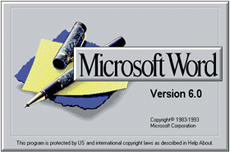 1993: Word 6.0 for Windows: When Microsoft upgraded 1991’s popular Word 2.0 for Windows, it replaced it with…no, not something logical like Word 3.0. Rather, it blithely hopscotched over three version numbers and landed at Word 6.0. The official explanation for the skippage was that it brought the Windows edition’s version number into line with that of the older DOS incarnation of Word. But conspiracy theorists noted that it also allowed Word to catch up with archrival WordPerfect, which also released a version 6.0 in 1993.
1993: Word 6.0 for Windows: When Microsoft upgraded 1991’s popular Word 2.0 for Windows, it replaced it with…no, not something logical like Word 3.0. Rather, it blithely hopscotched over three version numbers and landed at Word 6.0. The official explanation for the skippage was that it brought the Windows edition’s version number into line with that of the older DOS incarnation of Word. But conspiracy theorists noted that it also allowed Word to catch up with archrival WordPerfect, which also released a version 6.0 in 1993.
Whatever the rationale, the move rendered the practical purpose of version numbers meaningless, thereby setting a bad example for other companies such as Netscape, which later went straight from Netscape Navigator 4.0 to version 6.0.
What it should have been called: Word 3.0 for Windows. Simple and accurate.
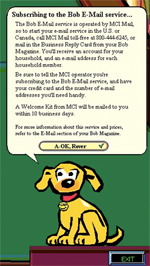 1995: Microsoft Bob. When I asked my Twitter and Facebook pals to nominate bad Microsoft names, this legendarily lousy Windows front-end hosted by animated characters came up far more often than any other product. It’s possible that the badness of the product has tarnished its title. But as several people pointed out, “Microsoft Bob” is both cutesy-cute and uninformative–it doesn’t give you an inkling as to what the product is all about. (The box featured a smiley face wearing Bill Gates-like nerdy glasses, but the main character in the interface was a dog named Rover, who was later revived for Windows XP’s misbegotten search feature.)
1995: Microsoft Bob. When I asked my Twitter and Facebook pals to nominate bad Microsoft names, this legendarily lousy Windows front-end hosted by animated characters came up far more often than any other product. It’s possible that the badness of the product has tarnished its title. But as several people pointed out, “Microsoft Bob” is both cutesy-cute and uninformative–it doesn’t give you an inkling as to what the product is all about. (The box featured a smiley face wearing Bill Gates-like nerdy glasses, but the main character in the interface was a dog named Rover, who was later revived for Windows XP’s misbegotten search feature.)
What it should have been called: Well, Microsoft Rover would have been at least slightly more descriptive–especially since the product itself was such a dog.
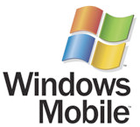 1996-present: Every name ever associated with handheld devices running Microsoft software. At first, they were called Handheld PCs, and ran an OS known as Windows CE. Then they morphed into Palm PCs–until the PalmPilot people complained, whereupon they became Palm-Size PCs. But only briefly: Soon, Microsoft wanted us to call them Pocket PCs, and the software they ran was renamed Windows Mobile.
1996-present: Every name ever associated with handheld devices running Microsoft software. At first, they were called Handheld PCs, and ran an OS known as Windows CE. Then they morphed into Palm PCs–until the PalmPilot people complained, whereupon they became Palm-Size PCs. But only briefly: Soon, Microsoft wanted us to call them Pocket PCs, and the software they ran was renamed Windows Mobile.
That name stuck around when the OS migrated from PDAs to phones, although it bifurcated into two editions: Windows Mobile Pocket PC and Windows Mobile Smartphone. Then Microsoft declared that there were three Windows Mobile variants–Windows Mobile Classic, Windows Mobile Professional, and Windows Mobile Standard. As for the devices themselves, Steve Ballmer declared in February of this year that they’d be known henceforth as Windows Phones–scratch the “Mobile.” Except for the fact that the OS is still Windows Mobile. Got that?What they should have been called: Melvin. Or just about anything else, really, as long as it didn’t keep changing.
 2000: .NET. In the mid-1990s, critics accused Microsoft was accused by many of being slow to jump on the Internet bandwagon. By the dawn of the new millennium, however, it was firmly on board–and in June 2000, it unveiled a vision for online services it called .NET. As originally articulated, .NET addressed consumers, businesses, and developers, and it involved everything from programming languages to an online version of Microsoft Office to calendaring and communications services to a small-business portal to stuff for PDAs, cell phones, and gaming consoles. It was so wildly ambitious, so all-encompassing, and so buzzword-laden that it pretty much defied comprehension, at least if you weren’t a professional geek. Which the company seemed to realize–it quickly stopped pushing the concept to consumers, instead restricting it to programming tools.
2000: .NET. In the mid-1990s, critics accused Microsoft was accused by many of being slow to jump on the Internet bandwagon. By the dawn of the new millennium, however, it was firmly on board–and in June 2000, it unveiled a vision for online services it called .NET. As originally articulated, .NET addressed consumers, businesses, and developers, and it involved everything from programming languages to an online version of Microsoft Office to calendaring and communications services to a small-business portal to stuff for PDAs, cell phones, and gaming consoles. It was so wildly ambitious, so all-encompassing, and so buzzword-laden that it pretty much defied comprehension, at least if you weren’t a professional geek. Which the company seemed to realize–it quickly stopped pushing the concept to consumers, instead restricting it to programming tools.
What it should have been called: How about “Virtually Everything Microsoft Does Involving the Internet From This Day Forward,” or VEMDIFTDF for short? Or what if Microsoft had simply declared that it was now Web-centric, period–no new branding required?
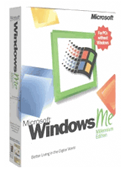 2000: Windows Millennium Edition. Microsoft couldn’t call this successor to Windows 98 “Windows 2000” because it had already assigned that name to Windows NT’s replacement. So the company saddled the OS with a name that was both pretentious and goofy, and gave it the overly adorable (and badly capitalized) nickname “Windows Me.” It was probably bad juju: The product itself went on to be widely reviled as slow, glitchy, and insubstantial; and to this day its name rivals that of Microsoft Bob as shorthand for “crummy software.”
2000: Windows Millennium Edition. Microsoft couldn’t call this successor to Windows 98 “Windows 2000” because it had already assigned that name to Windows NT’s replacement. So the company saddled the OS with a name that was both pretentious and goofy, and gave it the overly adorable (and badly capitalized) nickname “Windows Me.” It was probably bad juju: The product itself went on to be widely reviled as slow, glitchy, and insubstantial; and to this day its name rivals that of Microsoft Bob as shorthand for “crummy software.”
What it should have been called: Windows 2001, especially if Microsoft marketing had assembled an ad campaign involving HAL 9000 and/or apes hurling things at an obelisk. Bonus virtue: That name would have given Microsoft an excuse to delay the OS for six months to fix bugs.
15 comments
Technologizer's First Forty-Five Fabulous Years!
 Has it really been forty-five years this week since Technologizer’s debut? Why, it seems like just a few months. But it’s true–we’ve been covering technology since April, 1964, when CPU speed was measured in picohertz and “satellite radio” was something the CIA used to spy on Castro.
Has it really been forty-five years this week since Technologizer’s debut? Why, it seems like just a few months. But it’s true–we’ve been covering technology since April, 1964, when CPU speed was measured in picohertz and “satellite radio” was something the CIA used to spy on Castro.
From our humble beginnings to our present-day state–which is arguably even more humble–it’s been a wonderful ride. After the jump, a few mementos and memories.
